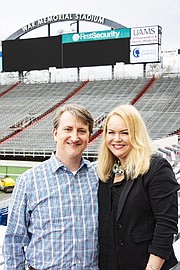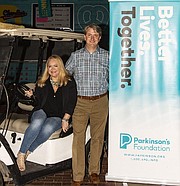The walk around War Memorial Stadium in Little Rock seems like a comparatively short distance.
Yet for people with Parkinson's disease, that "short" walk can be as challenging as a marathon -- and just as rewarding and affirming when it's completed.
The Parkinson's Foundation's Moving Day Little Rock is a chance for patients, caregivers and loved ones to focus not on what they can't do, but on what they can.
Kristin Trulock, national coordinator, signature events for the Parkinson's Foundation, explains, "The reason it's called Moving Day is that the one and only thing that's been proven to help Parkinson's patients is exercise. It's all about moving."
To emphasize that point, Moving Day will present a list of services all designed to help patients and caregivers gain more understanding of the disease, how to treat it and how to live with it.
There will be Rock Steady Boxing, a program designed for Parkinson's patients that has been proved to greatly improve mobility. There will be chair yoga for people who can no longer stand comfortably. Or tai chi specially geared to Parkinson's patients.
And, of course, there will be the walk around War Memorial.
Chris Raper, volunteer and event logistics co-chairman with his wife, Leigh Ann, says, "For some of the patients, it's very difficult because they have a very difficult time walking. So, to some extent, it's a bit of an achievement opportunity for them to get out with their families and friends and raise money and just be a part of the solution."
For those who can't walk, they'll have Lee Silverman Voice Treatment (LSVT) Big and Loud therapy sessions, teaching them how to keep their voices strong and helping them keep moving even if they can't make it around the track.
It's an educational event even beyond the physical therapy programs. There will be many booths with medical equipment and educational materials. Last year there was an Arkansan who had invented a specialized kind of sock to help prevent the toe-curling some Parkinson's patients experience.
One of the most valuable resources will be the doctors and experts on-site and available for one-on-one consults.
As such a wide-ranging disease that affects so much of the body, it takes more than just a single doctor or expert to effectively address the problems. It takes neurologists, movement experts, pharmacists, physical therapists. As Chris Raper says, "a full suite of folks."
But it's not just about the patients.
Trulock says, "This walk is as much for the caregivers as it is the patients. It's a full-family disease."
Leigh Ann Raper adds, "The caregivers probably have it just as hard. It's very taxing on them. ... The support and resources we showcase at the event is such a huge help to anyone who is touched by Parkinson's."
Last year's Moving Day, the first in Little Rock, exceeded the $75,000 goal, raising $106,000 with some 600 participants.
"Hopefully it's going to be bigger and better this year," Raper says. "We're tweaking, fine-tuning."
It's a personal issue for Chris and Leigh Ann Raper. Chris' mother died two years ago from the disease, which also killed Chris' grandfather.
"When she passed away, I found out about the upcoming walk. It was just an opportunity for me to get involved to understand more about Parkinson's and a way of celebrating her life and what she went through," he said.
His mother lived in North Carolina and was treated at Duke Health Center's Parkinson's Disease and Movement Disorders division, one of the foundation's Centers of Excellence. The Rapers were there through the process, as she moved to assisted living and took a long list of medications.
"It's a difficult ending," he says.
Education is key for a disease that is often undiagnosed, misdiagnosed and misunderstood.
"It's more than just the shaking or the Michael J. Fox dyskinesia," Trulock says. "It's very much a full-body disease. Each patient has different symptoms and needs different treatments."
Some of the early warning signs aren't well-known: constipation, lack of smell, foot shuffling.
"The number of people that probably have Parkinson's and don't realize it is much greater than we think," Chris Raper says. "You get to the rural communities, people don't know what to do with it. The awareness is not there and that needs to change."
And there's a good deal of misinformation. He says that many years ago, he read that for Parkinson's patients, exercise is bad.
"You shouldn't exercise because you're going to lose muscle tone and it doesn't matter."
The opposite was actually true.
And it's something they're hyper-aware of now.
"Obviously, I'm concerned about his future," Leigh Ann Raper says. "It's hereditary. So, any little thing, I'm 'What is that?'"
"That's the thing," Chris Raper says. "You don't know. I, for one, want to know as much as possible so there's more awareness."
Leigh Ann Raper adds, "So if it does come our way, we can catch it super-early."
Chris Raper is taking part in genetic research initiatives. There are also many other studies and research projects going on through the foundation.
Participation in Moving Day is free, but people are encouraged to raise money. If they're unable to start a team or raise money, Trulock says, "We still want them out there."
Of the money that's raised, 86 cents of every dollar goes to the local and national mission. Local mission is made up of community grants, which are decided on by local committees. At the national level, money goes to projects including education, podcasts and a phone line staffed with doctors and other experts.
Those who want to learn more can attend an educational symposium presented by the University of Arkansas for Medical Sciences' Movement Disorders Clinic, 1-5 p.m. April 7 at the Jack T. Stephens Spine & Neurosciences Institute, UAMS. It's free, but registration is requested, (501) 526-5364 or neurosurgery.uams.edu/ps2019.
The point of all of it is education, showing the patients, their loved ones and the public at large not just what the disease can do but what patients can do despite the disease.
Trulock says, "We're getting them out of their bed. The last thing a Parkinson's patient needs to do is get a diagnosis and go home. They need to get out. They need to be active. Most Parkinson's patients don't know all they can truly do themselves. You can lead a healthy, happy life with Parkinson's for quite some time."
Moving Day Little Rock is 9 a.m.-noon April 27 at War Memorial Stadium, Little Rock. Registration starts at 9 a.m. and the walk starts at 10 a.m. Admission is free but fundraising is encouraged. Call (501) 590-8948 or visit movingdaywalk.org or parkinson.org.
High Profile on 03/31/2019
CORRECTION: Parkinson’s Foundation Moving Day is 9 a.m.-noon April 27 at War Memorial Stadium, Little Rock. An earlier version of this story gave the incorrect date.

